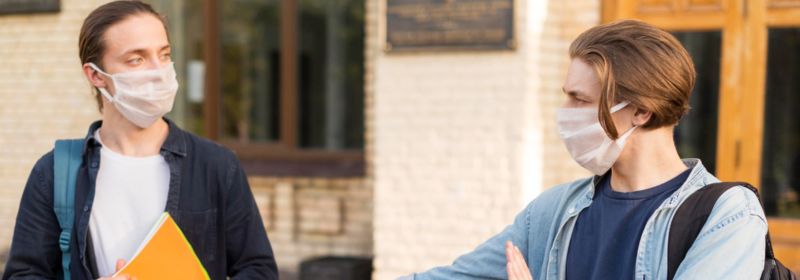Safety and security considerations for International students studying MBBS abroad

For many families, the decision to send a student abroad for their MBBS studies is filled with mixed emotions. Excitement for the incredible opportunities ahead is often matched by a deep concern for their safety and well-being in a foreign land. It's natural for both students and their parents to have safety as their top priority. The thought of being in an unfamiliar country can bring a mix of anticipation and anxiety.
The journey to earning an MBBS degree overseas is not always smooth sailing. There will be days filled with joy and others that may test your resilience. It's a path that demands preparation, awareness, and adaptability. In this blog, we'll look into essential safety and security considerations for students studying abroad.
1. Know about the country:
Before you head abroad for your MBBS studies, take the time to thoroughly research your destination country. This will help you understand its culture, safety measures, and other important aspects. By gaining information about the country's background, you'll be better equipped to make informed decisions.
Learning about the country from top to bottom is a crucial step toward ensuring a smooth and secure study experience. Trust me this process will greatly benefit you in the long run. Make it a priority to familiarize yourself with your chosen destination before starting on your educational journey.
2. Keep up the essential documents:
It's really important to collect and safely keep all your important papers, like your mark sheets and certificates. These documents are important to have with you. Also, make sure to keep your passport in a safe place, especially since you'll be in a different country where it's very important.
For extra safety, it's a good idea to have digital copies of all your documents. Store these copies in the cloud so you can access them anytime.
3. Insurance:
Getting health insurance coverage is very important when you're study MBBS abroad. It's something that might seem like just another item on your checklist, but its importance cannot be overstated. If you ever fall ill unexpectedly, having health insurance can be a lifesaver. It's not just about the medical bills, it's about the peace of mind that comes with knowing you're covered in case of emergencies.
Many students who have been through the experience of studying abroad will tell you that health insurance was a critical support during their time away from home. It ensures you can access the best possible care without worrying about the financial impact.
4. Stay connected with the Embassy:
Registering with your embassy upon arriving in a new country should not be overlooked. As a new resident, particularly a student, it's essential to make your presence known to your country's representatives abroad.
Consider buying an extra phone dedicated to international usage, especially if you need to keep your primary phone number active for local contacts or emergencies. Having a local SIM card ensures that you have reliable access to calls, texts, and data, making it easier to handle your new surroundings and stay connected with family and friends back home.
5. Choose a safe neighborhood for Accommodation:
When selecting accommodation, prioritize safety and proximity to a student community. Seek recommendations from seniors or fellow students who have experience living in the area. As a newcomer to the country, opt for a neighborhood where you feel comfortable and supported. Initially, choose a location that facilitates easy access to essentials and campus facilities.
Once you're more familiar with the country and its neighborhoods, you can consider moving to areas that align with your preferences and interests. Remember, finding accommodation in a safe and student-friendly area lays a solid foundation for a positive and fulfilling study abroad experience.
6. Know about the laws:
Before you go to the country you've picked, learn about its rules and laws. They might be very different from what you're used to at home. It might be difficult at first, but you'll get used to them over time. Knowing the rules helps you avoid problems and fit in better.
You can check official websites or ask for advice to understand everything better. Being aware of the laws makes your time abroad safer and more enjoyable.
7. Keep in contact with loved ones:
Stay connected with the people you're close to and let them know where you are. It's important to keep them updated, especially in case of emergencies. With technology nowadays, you can easily stay in touch through video calls and messages. Having a support network can provide comfort and assistance when needed.
Whether it's friends, family, or mentors, having someone to reach out to can make a big difference. Make it a habit to check in with them regularly and keep them informed about your well-being while you're studying abroad.
8. Updation of the current events:
Students need to stay updated on local and global events. Keeping track of politics, both locally and internationally, helps you understand what's happening and how it might affect you. Pay attention to the relationship between your home country and the country you're living in.
Knowing about international bonds can give you insights into diplomatic relations and potential impacts on your stay abroad. Stay informed by reading news articles, and engaging in discussions with peers.
9. Build network with the locals:
Connecting with locals is a great way to learn about the country you're in. They have lived there for a long time and understand the area well, including safety concerns. Locals know the ins and outs of the city and can offer valuable insights into its culture and customs. By interacting with them, you can gain a deeper understanding of the local way of life and feel more comfortable to get into your surroundings.
Whether it's asking for recommendations or simply striking up a conversation, building relationships with locals can enrich your study abroad experience. Take the opportunity to learn from their experiences and perspectives, as it can help you adapt to your new environment.
Conclusion:
Studying MBBS abroad is generally safe, as institutions often provide adequate safety measures. However, it's essential to take additional safety precautions to ensure your well-being while overseas. By implementing these measures, you can handle your study abroad experience with confidence. I hope this blog has provided valuable insights into the safety and security considerations for studying MBBS abroad, helping you feel more prepared for your journey ahead.
